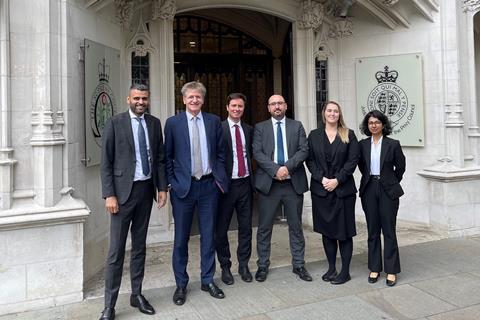A holiday sickness claimant who presented uncontested expert evidence and then lost his case was denied a fair trial, the Supreme Court has ruled.
Justices unanimously upheld an appeal from Peter Griffiths and said the trial judge had been wrong to allow defendant TUI to make detailed attacks of an expert witness report which had backed his claim.
The outcome will be welcomed by lawyers waiting on hundreds of similar cases where holiday sickness claims have been challenged by insurers.
Giving the lead judgment in TUI UK Ltd v Griffiths, Lord Hodge said it was ‘trite law that English law operates an adversarial system’ and it was an important part of a judge’s role to make sure proceedings are fair. This included showing fairness to the party who has adduced the evidence of an impugned witness.
‘In the absence of a proper challenge on cross-examination it was not fair for TUI to advance the detailed criticisms of [the] report in its submissions or for the trial judge to accept those submissions,’ said Hodge.
‘Both the trial judge and the majority of the Court of Appeal erred in law in a significant way. The trial judge did not consider the effect on the fairness of the trial of TUI’s failure to cross-examine [the expert]. The majority of the Court of Appeal did, but they erred in limiting the scope of the rule to challenges to the honesty of a witness.’
IT consultant Griffiths had sued travel company TUI for £29,000 after suffering a serious stomach upset while staying in a hotel resort in Turkey which left him with long-term health problems and permanent symptoms.
He presented evidence from an expert identified as Professor Pennington, who concluded the likely cause of his illness was the food and drink served at the hotel.
TUI did not cross-examine Pennington or present any evidence of its own on the question of causation. It made closing submissions at trial saying Pennington had given an incomplete explanation and failed to discount other possible causes.
The defendant won at trial before Griffiths’ appeal was successful in the High Court. TUI successfully challenged that in the Court of Appeal, prompting the claimant to go to the Supreme Court.

The issue had divided the Court of Appeal: Lady Justice Asplin and Lord Justice Nugee found in favour of TUI but Lord Justice Bean disagreed, calling the defence ‘litigation by ambush’.
Lord Hodge said that in an adversarial system it was the parties that frame the issues which the court is to determine, and it was not the court’s business to investigate admitted facts. He ruled that the expert report relied upon was sufficient and that Griffiths had established his case.
Speaking today, Jatinder Paul, a partner with Irwin Mitchell who represented Griffiths, said the judgment provides guidance to the courts on dealing with unchallenged expert evidence, as well as vindication for his client.
‘It’s been tough for Peter since 2014, dealing with the ongoing effects of his illness while also dealing with a David v Goliath legal battle against a tour operator with very deep pockets,’ said Paul. ‘We presented expert evidence in the original trial with regards to the cause of Peter’s illness which was not challenged either by cross-examination or via an alternative expert report from the defendant.’
This article is now closed for comment.



























11 Readers' comments